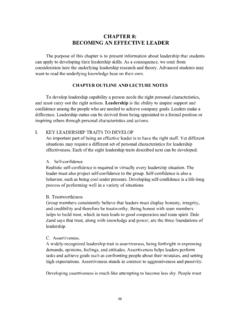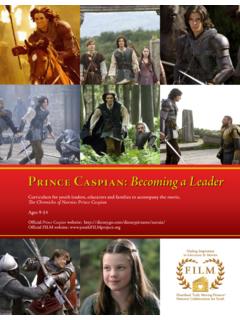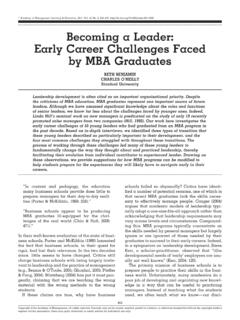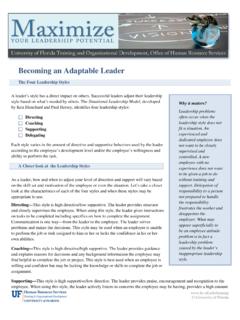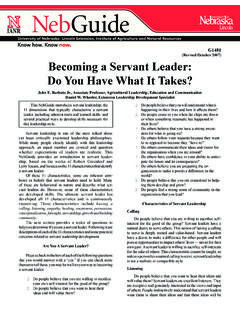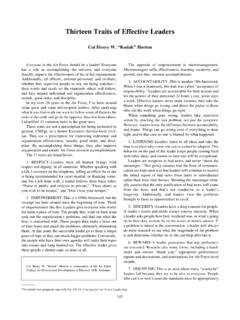Transcription of Bennis, Warren. (1989) On becoming a leader. New York ...
1 Bennis, Warren. (1989) On becoming a leader. New York: Addison Wesley Managing/Leading Pp. xii-xiv So what does this mean for leaders of the twenty-first century? Well, it means a number of things, but three, at least are at the top of te list. First, staying with the status quo is unacceptable. It won=t work. Second, one has to keep in mind that the key to competitive advantage in the nineties and beyond will be the capacity of leadership to create the social architecture capable of generating intellectual capital. And intellectual capital means ideas, know-how, innovation, brains, knowledge, and expertise.
2 That=s what is going to make the difference, the decisive difference between organizations and companies that succeed and those that fail. Restructuring and re-engineering can take you only so far. But you cannot restructure or re-engineer your company into prosperity. That takes ideas and re-invention. You cannot release the brain power of any organization busing whips and chains. You get the best out of people by empowering them, by supporting them, by getting out of their way. What Followers Want P. xiii ..leadership in light of the seismic changes taking place in our global economy is that followers need from their leaders three basic qualities: they are direction; they want trust.
3 And they want the trust factor will reign as the most pivotal factor of a leader=s success, whether at the presidential level or the chair of the PTA. Tripod Pp. xiii-xiv ..one leg of the tripod is ambition; another leg is competence; and the third leg is integrity, moral fabric. Commencement Speech P. xiv And if I were restricted to three basic ingredients for success. And if I were restricted to three words in any commencement speech, they would be Ideas, Relationships, and Adventure. Ideas are the basis for change, for in-invention, for, yes, intellectual capital.
4 Relationships have to do with outstanding people working in harmony and openness, where everyone feels empowered, where all members free included and at the center of things, where they feel competent and significant. And Adventure has to do with risk, with a bias toward action, with curiosity and courage. And the challenge of leadership is to create the social architecture where ideas, relationships and adventure can flourish. Introduction Bennis B On becoming a Leader Page 1 of 21. To an extent, leadership is like beauty: it=s hard to define, but you know it when you see it.
5 But since leadership, by definition, cannot take place in a vacuum, I=ve begun with the current context. As Ralph Waldo Emerson said, AThe man is only half himself, the other half is his On becoming a Leader is based on the assumption that leaders are people who are able to express themselves fully. By this I mean that they know who they are, what their strengths and weaknesses are, and how to fully deploy their strengths and compensate for their weaknesses. They also know what they want, why they want it, and how to communicate what they want to others, in order to gain their cooperation and support.
6 Finally, they know how to achieve their goals. The key to full self-expression is understanding one=s self and the world, and the key to understanding is learning - from one=s own life and experience. In fact, the process of becoming a leader is much the same as the process of becoming an integrated human being. First, they all agree that leaders are made, not born, and made more by themselves than by any external means. Second, they agree that no leader sets out to be a leader per se, but rather to express himself freely and fully.
7 That is, leaders have no interest in proving themselves, but an abiding interest in expressing themselves..this book is about adult But the best information we have suggests that adults learn best when they take charge of their own learning..the most pivotal was a concern with a guiding purpose, an overarching So learning is simply a matter of remembering what is important. As Jung said, psychoanalysis is less a form of healing than a form of learning..the capacity for leadership doesn=t guarantee that one will run a corporation or a government.
8 In fact, in the current win-or-die context, people of extraordinary promise often have more difficulty fulfilling their promise than people of more docile character, because, at least in our time, genuine achievement can be less valued than simplistic success, and those who are skilled at achieving prominence are not necessarily those who are ready to lead once they arrive. But it has many recurring themes - the need for education, both formal and informal; the need to unlearn so that you can learn (or, as Satchel Paige is supposed to have said, AIt=s Bennis B On becoming a Leader Page 2 of 21.)
9 Not what you don=t know that hurts you, it=s what you know that just ain=t so@); the need for reflecting on learning, so that the meaning of the lesson is understood; the need to take risks, make mistakes; and the need for competence, for mastery of the task at hand. Mastering The Context P. 13. leaders have a significant role in creating the state of mind that is the society. They can serve as symbols of the moral unity of the society. They can express the values that old the society together. Most important, they can conceive and articulate goals that lift people out of their petty preoccupations, carry them above the conflicts that tear a society apart, and unite them in pursuit of objectives worth of their best efforts.
10 John W. Gardner No Easy Victories Need for Leadership P. 15. One person can live on a desert island without leadership. Two people, if they=re totally compatible, could probably get along and even progress. If there are three or more, someone has to take the lead. Otherwise, chaos erupts. Basic Reasons Why leaders are Important P. 15. 1. First they are responsible for the effectiveness of organizations. 2. Second, the change and upheaval of the past years has left us with no place to hide. We need anchors in our lives, something like a trim-tab factor, a guiding purpose.
